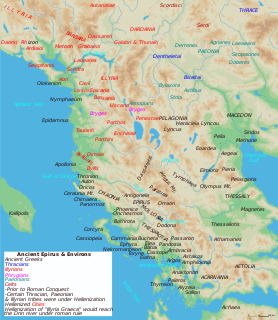Related Research Articles

In classical antiquity, Illyria was a region in the western part of the Balkan Peninsula inhabited by numerous tribes of people collectively known as the Illyrians. Illyrians spoke the Illyrian language, an Indo-European language, which in ancient times perhaps also had speakers in some parts in Southern Italy. The geographical term Illyris was sometimes used to define approximately the area of northern and central Albania down to the Aoös valley, including in most periods much of the lakeland area. In Roman times the terms Illyria / Illyris / Illyricum were extended from the territory that was roughly located in the area of the south-eastern Adriatic coast and its hinterland, to a broader region stretching between the Adriatic Sea and the Danube, and from the upper reaches of the Adriatic down to the Ardiaei. From about mid 1st century BC the term Illyricum was used by the Romans for the province of the Empire that stretched along the eastern Adriatic coast north of the Drin river, south of which the Roman province of Macedonia began.
Illyrian may refer to:
The Illyrians were a group of Indo-European speaking tribes, who inhabited the western Balkan Peninsula in ancient times. They constituted one of the three main Paleo-Balkan populations, along with the Thracians and Greeks.

The Illyrian Provinces were an autonomous province of France during the First French Empire that existed under Napoleonic Rule from 1809 to 1814. The province encompassed modern-day Croatia, Slovenia, Gorizia, and parts of Austria. Its capital was Ljubljana in Slovenia. It encompassed six départements, making it a relatively large portion of territorial France at the time. Parts of Croatia were split up into Civil Croatia and Military Croatia, the former served as a residential space for French immigrants and Croatian inhabitants and the latter as a military base to check the Ottoman Empire.
The Illyrian Wars were a series of wars fought between the Roman Republic and the Ardiaei kingdom. In the First Illyrian War, which lasted from 229 BC to 228 BC, Rome's concern was that the trade across the Adriatic Sea increased after the First Punic War at a time when Ardiaei power increased under queen Teuta. Attacks on trading vessels of Rome's Italic allies by Illyrian pirates and the death of a Roman envoy named Coruncanius on Teuta's orders, prompted the Roman senate to dispatch a Roman army under the command of the consuls Lucius Postumius Albinus and Gnaeus Fulvius Centumalus. Rome expelled Illyrian garrisons from a number of Greek cities including Epidamnus, Apollonia, Corcyra, Pharos and established a protectorate over these Greek towns. The Romans also set up Demetrius of Pharos as a power in Illyria to counterbalance the power of Teuta.

Pinnes was the son of Agron, king of the Ardiaei in Illyria, and Agron's first wife Triteuta. He officially succeeded his father as king in 230 BC, but the Ardiaean kingdom was ruled by Agron's second wife, Queen Teuta.

The Kingdom of Illyria was a crown land of the Austrian Empire from 1816 to 1849, the successor state of the Napoleonic Illyrian Provinces, reconquered by Austria in the War of the Sixth Coalition and restored according to the Final Act of the Vienna Congress. Its administrative centre was in Ljubljana

Uscana or Hyscana was a settlement of the Illyrian tribe of the Penestae in southern Illyria, modern Albania.

Epicaria or Durnium was a settlement in ancient Illyria, of the Illyrian tribe called the Cavii. It was close to Bassania.

Tilurium was an Illyrian fortified settlement of the Delmatae.
Chinna was an Illyrian settlement located near the White Drin, near the modern-day settlement of Klina.
The Enchelii, the inhabitants of Enchele, were an ancient people that lived around the region of Lake Shkodra, Lake Ohrid and Lynkestis, in modern-day Albania, North Macedonia and Greece. They are one of the oldest known peoples of the eastern shore of the Adriatic. In ancient sources they sometimes appear as an ethnic group distinct from the Illyrians, but are mostly mentioned as one of the Illyrian tribes.

Illyrian weaponry played an important role in the makeup of Illyrian armies and in conflicts involving the Illyrians. Of all the ancients sources the most important and abundant writings are those of Ennius, a Roman poet of Messapian origin. Weapons of all sorts were also placed intact in the graves of Illyrian warriors and provide a detailed picture for archaeologists on the distribution and development of Illyrian weaponry.

Bardylis II was an Illyrian king of the Dardanian Kingdom.
Pleuratus III was a ruler of the Illyrian kingdom under the Labeatan dynasty. He was the son of Scerdilaidas. Pleuratus continued his father's pro-Roman policy even more decidedly, so much that his loyalty to Rome was well known, even to other dynasts. He managed to extend the boundaries of the Illyrian State in the south when he was rewarded land annexed by Philip V of Macedon. He became one of the most prominent Illyrian kings of the time all because of his loyalty to the Romans. Pleuratus was succeeded by his son Gentius, who was the last Illyrian king.
Pleuratus II was an Illyrian king of the Ardiaean Kingdom.
The Battle of Phoenice was a battle that took place in 230 BC between the forces of the Epirote League and the Ardiaean Kingdom of Illyria.
The siege of Issa took place from 230 BC to 229 BC between the forces of the Ancient Greek colony of Issa, aided by the Roman Republic, and the Ardiaean Kingdom of Illyria.
References
- ↑ Puljić, Ivica; Škegro, Ante (July 2006). "Sarsenterska biskupija". Povijesni Prilozi. 25 (30): 7–50.